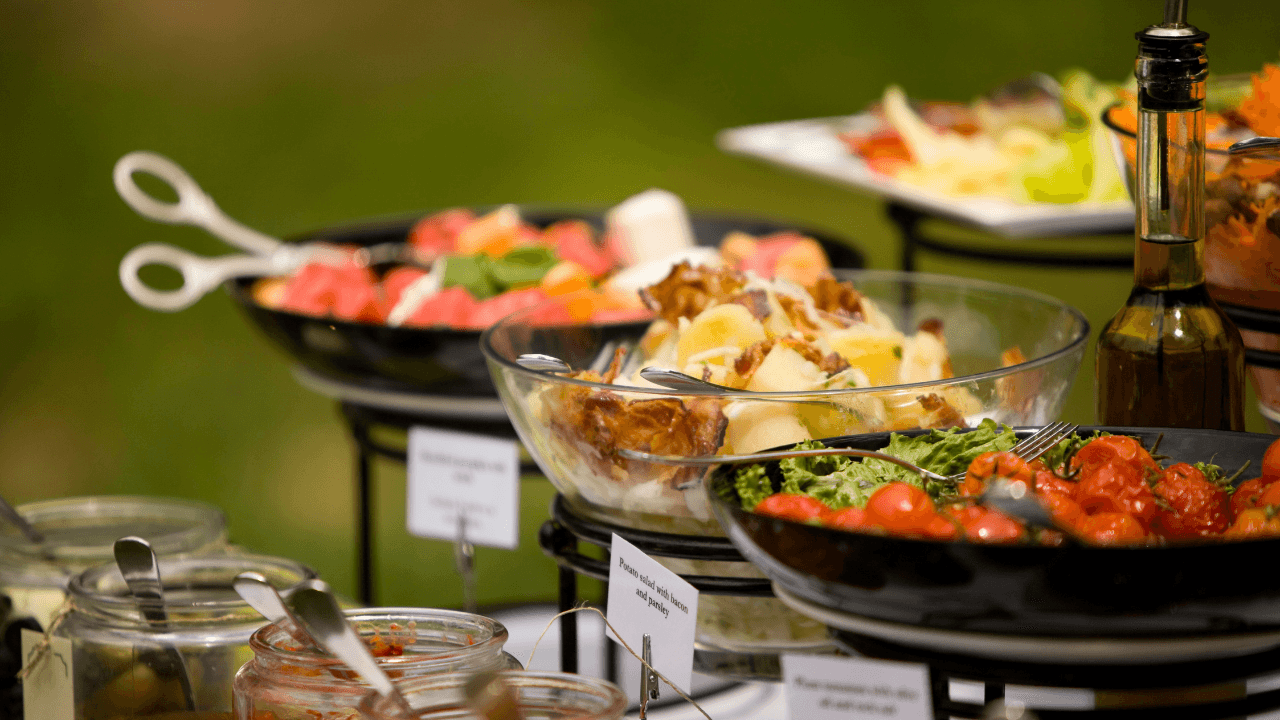- Why is Writing a Catering Business Plan Important?
- Steps to Crafting Your Own Catering Business Plan
In the world of gastronomy, where culinary dreams are transformed into delightful realities, lies the exhilarating journey of a catering business.
But with every successful catering business comes many challenges owners face, from unexpected costs arising from high food prices and energy consumption to marketing and other cost overruns.
That’s why crafting a winning caterer’s business plan is your backstage pass to orchestrating this symphony of flavors and experiences.
Join us on a delectable adventure as we guide you through the step-by-step process of creating a blueprint that satisfies the palate and fuels the flames of your entrepreneurial ambitions.
Why is Writing a Catering Business Plan Important?
Writing a catering business plan is crucial for several important reasons:
Clarity of Vision
A business plan forces you to define your catering business goals, mission, and vision. It helps you articulate what you want to achieve and how you plan to get there. This clarity of vision is essential for both you and potential investors or partners to understand the purpose and direction of your catering business.
Strategic Planning
A well-thought-out business plan outlines your business strategies and tactics. It details your target market, competition, pricing, and marketing plans. This strategic planning process helps you identify potential challenges and opportunities in the catering industry.
Financial Planning
One of the most important aspects of a business plan is financial planning. It includes projections for startup costs, operating expenses, revenue forecasts, and profit margins. This financial roadmap helps you manage your finances effectively, secure funding, and ensure the sustainability of your catering business.
Risk Assessment
A business plan encourages you to conduct a thorough risk assessment. By identifying potential risks and challenges in advance, you can develop contingency plans to mitigate these risks. This proactive approach is essential for the long-term success of your catering venture.
Attracting Investors and Lenders
If you seek external funding or loans, a well-prepared business plan is necessary. Investors and lenders rely on business plans to evaluate your catering business’s viability and potential return on investment. A solid plan can make your business more attractive to potential backers.
Setting Milestones and Measuring Progress
Your business plan serves as a roadmap with clear milestones and key performance indicators (KPIs). It allows you to track your progress over time and make adjustments when necessary. This continuous monitoring and adaptation are essential for staying competitive and achieving long-term success.
Legal and Regulatory Compliance
A business plan prompts you to research and understand your area’s legal and regulatory requirements, which can vary widely for catering businesses. Ensuring compliance from the outset can prevent legal issues that may arise later.
Team Alignment
A business plan helps align everyone with the business’s goals and strategies if you have a team or plan to hire employees. It provides a comprehensive overview of the company’s mission and direction, helping employees understand their roles in achieving success.
Marketing and Branding
Your business plan outlines your restaurant marketing and branding strategies. This includes how you’ll position your catering business in the market, target your ideal clients, and create a unique selling proposition. A well-defined marketing plan can help you stand out in a competitive industry.
Steps to Crafting Your Own Catering Business Plan
Crafting a catering business plan involves several key steps to ensure that your venture is well-prepared for success.
Your Inbox, Your Rules!
Tailor your newsletter with the topics you're most interested in.
Here’s a step-by-step guide to help you get started:
Executive Summary
Begin with an executive summary that provides an overview of your catering business. Include a brief description of your business concept, mission statement, and a summary of your key financial projections. This section is a snapshot of your entire plan and should grab the reader’s attention.
Catering Company Description
Describe your catering business in more detail. Explain your company’s history (if applicable), legal structure, location, and any relevant background information about the founders or management team.
Market Research
Conduct thorough market research to understand your target market, including demographics, preferences, and trends. Analyze your competition and identify gaps or opportunities in the catering industry. Use this information to define your niche and unique selling points.
Products and Services
Detail the catering services you will offer. This should include menu options, pricing strategies, and any specialty cuisines or dietary accommodations you provide. Highlight what sets your catering business apart from others.
Marketing and Sales Strategy
Outline your marketing plan, including strategies for reaching your target audience, promoting your catering services, and building your brand. Describe your sales approach, such as generating leads, converting prospects into clients, and retaining repeat customers.
Operational Plan
Explain the day-to-day operations of your catering business. This should cover aspects like sourcing ingredients, food preparation, staffing requirements, and equipment needs. Include details on your suppliers and any partnerships you have or plan to establish.
Management and Team
Introduce your management team and key personnel. Highlight their relevant experience and qualifications. If applicable, provide an organizational chart to illustrate the structure of your catering business.
Financial Projections
Create detailed financial projections, including startup costs, revenue forecasts, and cash flow statements. Be realistic in your estimates and consider various scenarios. This section is critical for attracting investors or lenders.
Funding Requirements
If you need external funding, specify the amount and the purpose (e.g., startup costs, expansion, equipment purchase). Explain how you plan to use the funds and how they will benefit your catering business.
SWOT Analysis
Conduct a SWOT analysis (Strengths, Weaknesses, Opportunities, Threats) to evaluate the internal and external factors that may impact your catering business. Use this analysis to develop strategies for capitalizing on strengths and mitigating weaknesses.
Milestones and Metrics
Define key milestones and measurable metrics that will help you track progress and success. This could include the number of bookings, revenue targets, customer satisfaction scores, or expansion goals.
Appendix
Include any additional information that supports your catering business plan, such as sample menus, market research data, resumes of key team members, or legal documents.
Review and Revise
Before finalizing your catering business plan:
- Review it carefully for clarity, coherence, and accuracy.
- Consider seeking feedback from mentors, advisors, or industry experts.
- Revise as needed to ensure it reflects your vision accurately.
Create Your Business Plan and Pave the Right Way to Success
As you embark on this gastronomic adventure, remember that flexibility and adaptability are key. The catering industry is dynamic and ever-evolving, and your ability to pivot and innovate will be invaluable.
With a well-structured business plan in hand, you are not merely preparing to serve exquisite dishes; you are laying the foundation for a thriving catering business. Your plan is your recipe for success, combining the finest ingredients of vision, strategy, and execution.
Now, armed with this plan, set forth with confidence, determination, and a passion for culinary excellence. The world of catering awaits, ready to savor the unique flavors and experiences your business will bring to the table.
Orders.co is your invaluable ally in the catering business, offering a suite of tools to conquer industry challenges. With their commission-free website, you can establish a powerful online presence, attracting customers without the burden of extra fees.
Managing your catering menu becomes a breeze, ensuring that your offerings are up-to-date and tailored to your clients’ preferences
May your catering venture be a resounding success, leaving a lasting impression on every plate you serve and every event you grace. Bon appétit!



